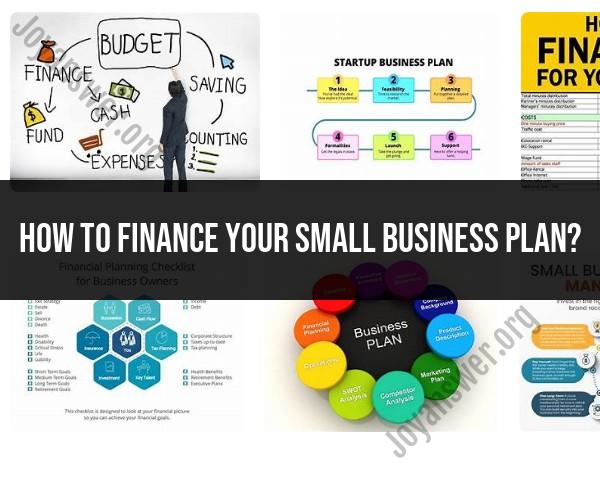How to finance your small business plan?
Financing a small business requires careful planning and consideration of various funding options. Here's a comprehensive guide on how to finance your small business plan:
Create a Detailed Business Plan:
- Develop a comprehensive business plan that outlines your business model, target market, competition, revenue projections, and financial needs.
- A well-thought-out business plan is crucial for attracting investors and lenders.
Determine Funding Requirements:
- Identify the specific financial needs of your business. Consider startup costs, operational expenses, marketing, and working capital requirements.
Explore Personal Savings:
- Use personal savings as an initial source of funding. This demonstrates your commitment to the business and can make your venture more attractive to lenders and investors.
Friends and Family:
- Seek financial support from friends and family who believe in your business idea.
- Clearly communicate the terms of the investment or loan, and formalize agreements in writing to avoid misunderstandings.
Bootstrapping:
- Bootstrap by operating on a lean budget and using revenue generated by the business to fund its growth.
- Prioritize essential expenses and focus on generating early revenue.
Small Business Loans:
- Explore traditional loans from banks and credit unions. The Small Business Administration (SBA) in many countries provides government-backed loan programs for small businesses.
- Be prepared to provide a solid business plan, financial statements, and collateral to secure a loan.
Microloans:
- Microloan programs, often offered by community development financial institutions (CDFIs) or non-profit organizations, provide smaller loan amounts to startups and small businesses.
Angel Investors:
- Angel investors are individuals who invest their personal funds in exchange for equity in the business.
- Connect with angel investor networks, attend pitch events, and prepare a compelling pitch to attract potential investors.
Venture Capital:
- Venture capital (VC) firms invest larger amounts of money in exchange for equity.
- VC funding is often suitable for high-growth startups with the potential for substantial returns.
Crowdfunding:
- Utilize crowdfunding platforms like Kickstarter, Indiegogo, or GoFundMe to raise funds from a large number of individuals.
- Create a compelling campaign, set funding goals, and offer rewards or equity in return for contributions.
Grants:
- Explore government grants, industry-specific grants, or private foundation grants that may be available to support small businesses.
- Research eligibility criteria and application processes for grants.
Business Incubators and Accelerators:
- Join business incubators or accelerators that provide funding, mentorship, and resources to startups in exchange for equity.
- Participating in these programs can also enhance your business's credibility.
Factoring or Invoice Financing:
- If your business deals with invoices, consider factoring or invoice financing to receive immediate cash by selling your outstanding invoices to a third party.
Business Credit Cards:
- Use business credit cards for short-term financing needs. Many credit cards offer introductory 0% APR periods for purchases.
Alternative Lenders:
- Explore alternative lending options, such as online lenders or peer-to-peer lending platforms, which may provide quicker access to funding with less stringent requirements.
Negotiate Supplier Financing:
- Negotiate favorable payment terms with suppliers to improve cash flow. Extended payment terms can provide additional time to generate revenue.
Revenue-Based Financing:
- Consider revenue-based financing where a business repays the funding with a percentage of its monthly revenue. This option is suitable for businesses with consistent revenue streams.
Prepare for Due Diligence:
- Be prepared for due diligence by potential investors or lenders. Have all necessary financial documents, legal agreements, and business records in order.
Financial Management:
- Implement sound financial management practices to demonstrate fiscal responsibility and attract potential investors and lenders.
Continuous Monitoring and Adjustments:
- Continuously monitor your business's financial performance and adjust your financing strategy based on changing needs and opportunities.
Remember, the best financing strategy often involves a combination of different sources. Evaluate each option carefully, considering your business's specific needs, stage of development, and financial goals. Additionally, seek professional advice from financial advisors or consultants to make informed decisions about financing your small business.
Financing Your Small Business Dreams: Options and Strategies
1. Effective Financing Strategies for Small Businesses:
- Solid Business Plan: Develop a well-researched and detailed plan outlining your business goals, financial projections, and funding needs. This acts as a roadmap for investors and lenders.
- Diversify Your Sources: Don't rely solely on one source. Consider a mix of debt, equity, grants, and alternative financing options to spread risk and secure the right amounts of capital.
- Strong Credit Score: Maintaining good personal and business credit scores improves your chances of qualifying for loans and securing favorable terms.
- Bootstrap & Build Value: Use personal savings, bootstrapping techniques, and early sales to gain traction and prove your concept before seeking external funding.
- Network & Build Relationships: Connect with investors, lenders, and other small business owners. Networking opens doors to funding opportunities and valuable advice.
2. Financing Options for Small Businesses:
- Debt Financing:
- Bank Loans: Traditional business loans offer fixed interest rates and repayment terms, but require strong credit and collateral.
- SBA Loans: Government-backed loans with favorable terms for eligible businesses, often requiring less collateral and more flexible qualifications.
- Lines of Credit: Provides flexible access to working capital for ongoing expenses, with interest charged only on borrowed amounts.
- Equity Financing:
- Angel Investors: Wealthy individuals who invest in startups in exchange for ownership equity and potential future returns.
- Venture Capital: Firms invest in high-growth potential businesses for significant equity stakes and board representation.
- Crowdfunding: Platforms like Kickstarter or GoFundMe allow raising capital from a large pool of individual investors in exchange for rewards or equity.
- Alternative Financing:
- Invoice Factoring: Sell outstanding invoices to factoring companies for immediate cash, but at a discount.
- Revenue-Based Financing: Investors provide funding based on a percentage of future revenue, with repayment tied to sales performance.
- Equipment Leasing: Finance essential equipment purchases without upfront costs, spreading payments over time.
3. Government Programs and Grants:
- SBA Grants: Programs like the Small Business Innovation Research (SBIR) grant offer non-repayable funding for research and development in specific industries.
- Local & State Grants: Many states and municipalities offer grants for businesses in specific sectors or locations.
- Tax Credits & Incentives: Various tax benefits and deductions exist for small businesses, like the research and development tax credit or deductions for hiring new employees.
Remember: Choosing the right financing option depends on your specific needs, stage of business growth, and risk tolerance. Carefully research and compare different options, seek professional advice if needed, and tailor your approach to secure the best financial foundation for your small business success.



